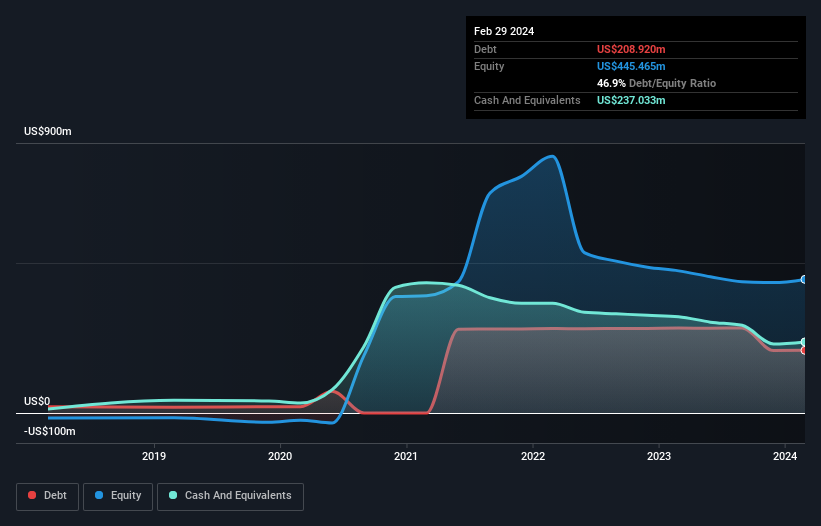- United States
- /
- Healthcare Services
- /
- NasdaqGS:ACCD
Does Accolade (NASDAQ:ACCD) Have A Healthy Balance Sheet?

The external fund manager backed by Berkshire Hathaway's Charlie Munger, Li Lu, makes no bones about it when he says 'The biggest investment risk is not the volatility of prices, but whether you will suffer a permanent loss of capital.' When we think about how risky a company is, we always like to look at its use of debt, since debt overload can lead to ruin. As with many other companies Accolade, Inc. (NASDAQ:ACCD) makes use of debt. But should shareholders be worried about its use of debt?
When Is Debt A Problem?
Debt and other liabilities become risky for a business when it cannot easily fulfill those obligations, either with free cash flow or by raising capital at an attractive price. Part and parcel of capitalism is the process of 'creative destruction' where failed businesses are mercilessly liquidated by their bankers. However, a more common (but still painful) scenario is that it has to raise new equity capital at a low price, thus permanently diluting shareholders. By replacing dilution, though, debt can be an extremely good tool for businesses that need capital to invest in growth at high rates of return. When we examine debt levels, we first consider both cash and debt levels, together.
Check out our latest analysis for Accolade
How Much Debt Does Accolade Carry?
As you can see below, Accolade had US$208.9m of debt at February 2024, down from US$282.9m a year prior. However, its balance sheet shows it holds US$237.0m in cash, so it actually has US$28.1m net cash.

A Look At Accolade's Liabilities
According to the last reported balance sheet, Accolade had liabilities of US$107.9m due within 12 months, and liabilities of US$234.8m due beyond 12 months. Offsetting this, it had US$237.0m in cash and US$27.7m in receivables that were due within 12 months. So it has liabilities totalling US$78.0m more than its cash and near-term receivables, combined.
Given Accolade has a market capitalization of US$530.5m, it's hard to believe these liabilities pose much threat. However, we do think it is worth keeping an eye on its balance sheet strength, as it may change over time. Despite its noteworthy liabilities, Accolade boasts net cash, so it's fair to say it does not have a heavy debt load! There's no doubt that we learn most about debt from the balance sheet. But ultimately the future profitability of the business will decide if Accolade can strengthen its balance sheet over time. So if you want to see what the professionals think, you might find this free report on analyst profit forecasts to be interesting.
In the last year Accolade wasn't profitable at an EBIT level, but managed to grow its revenue by 14%, to US$414m. We usually like to see faster growth from unprofitable companies, but each to their own.
So How Risky Is Accolade?
Statistically speaking companies that lose money are riskier than those that make money. And in the last year Accolade had an earnings before interest and tax (EBIT) loss, truth be told. And over the same period it saw negative free cash outflow of US$29m and booked a US$100m accounting loss. But the saving grace is the US$28.1m on the balance sheet. That means it could keep spending at its current rate for more than two years. Overall, we'd say the stock is a bit risky, and we're usually very cautious until we see positive free cash flow. There's no doubt that we learn most about debt from the balance sheet. However, not all investment risk resides within the balance sheet - far from it. Be aware that Accolade is showing 2 warning signs in our investment analysis , you should know about...
Of course, if you're the type of investor who prefers buying stocks without the burden of debt, then don't hesitate to discover our exclusive list of net cash growth stocks, today.
If you're looking to trade Accolade, open an account with the lowest-cost platform trusted by professionals, Interactive Brokers.
With clients in over 200 countries and territories, and access to 160 markets, IBKR lets you trade stocks, options, futures, forex, bonds and funds from a single integrated account.
Enjoy no hidden fees, no account minimums, and FX conversion rates as low as 0.03%, far better than what most brokers offer.
Sponsored ContentNew: Manage All Your Stock Portfolios in One Place
We've created the ultimate portfolio companion for stock investors, and it's free.
• Connect an unlimited number of Portfolios and see your total in one currency
• Be alerted to new Warning Signs or Risks via email or mobile
• Track the Fair Value of your stocks
Have feedback on this article? Concerned about the content? Get in touch with us directly. Alternatively, email editorial-team (at) simplywallst.com.
This article by Simply Wall St is general in nature. We provide commentary based on historical data and analyst forecasts only using an unbiased methodology and our articles are not intended to be financial advice. It does not constitute a recommendation to buy or sell any stock, and does not take account of your objectives, or your financial situation. We aim to bring you long-term focused analysis driven by fundamental data. Note that our analysis may not factor in the latest price-sensitive company announcements or qualitative material. Simply Wall St has no position in any stocks mentioned.
About NasdaqGS:ACCD
Accolade
Engages in the development and provision of personalized and technology-enabled solutions that help people to understand, navigate, and utilize the healthcare system and their workplace benefits in the United States.
Flawless balance sheet with concerning outlook.
Similar Companies
Market Insights
Community Narratives




